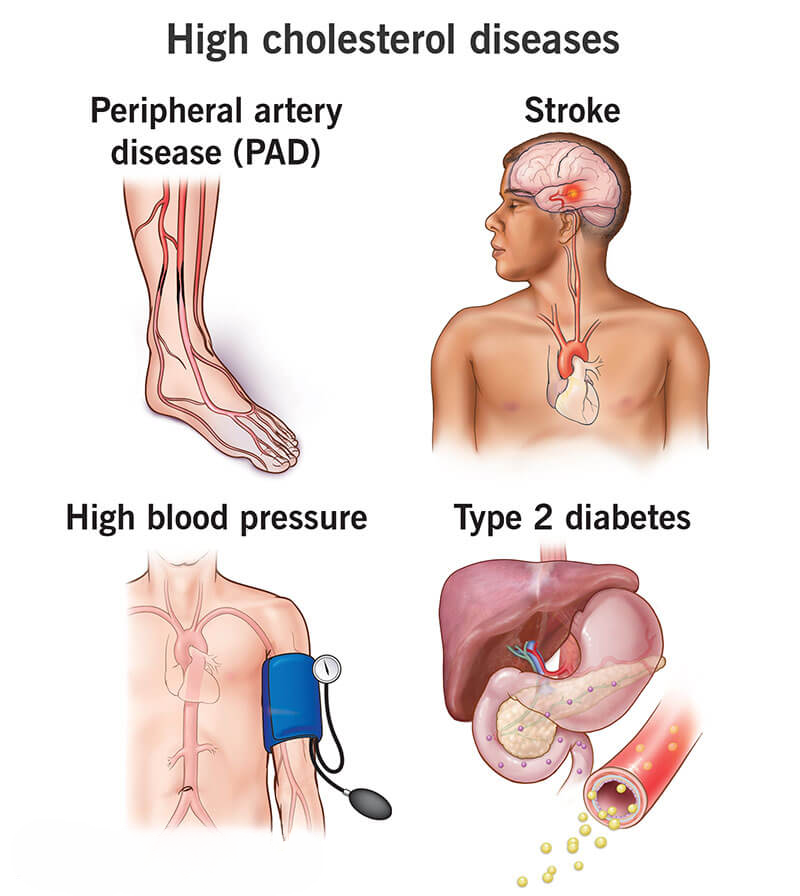Symptoms of high cholesterol often go unnoticed, increasing the risk of heart disease. Learn the signs, causes, and ways to manage cholesterol effectively
What exactly is high cholesterol?
Well, it happens when there’s an overload of cholesterol – a waxy, fat-like substance in your bloodstream. Your body actually needs cholesterol to create cells and hormones, but when there’s too much of it, it can lead to plaque forming in your arteries. This plaque can restrict blood flow and raise your chances of developing heart disease.
Different Types of Cholesterol
Low-Density Lipoprotein (LDL)
The “Bad” cholesterol, When the LDL cholesterol levels are high, it can lead to plaque buildup in your arteries, resulting in blockages and increasing the risk of heart disease.
High-Density Lipoprotein (HDL)
The “Good” cholesterol, On the flip side, HDL cholesterol works to clear LDL from your bloodstream, which helps lower the risk of heart disease.
Triglycerides
These are fats found in your blood, and having to many of them can also contribute to high cholesterol levels.
Symptoms of High cholesterol

One of the biggest risks of high cholesterol is that it often sneaks up on you without any clear symptoms until it leads to serious health issues. Still, there are a few signs that might suggest you have high cholesterol, such as:
- Chest pain (angina) – This can happen when blood flow to the heart is restricted.
- Shortness of breath – This may be a sign of clogged arteries.
- Heart attack or stroke – These are often the first major warning signs that something is wrong with your cholesterol levels.
- Yellowish fatty deposits (Xanthomas) – You might notice these around your eyes, elbows, knees, or hands in some severe cases.
Since high cholesterol usually doesn’t show any symptoms, getting regular tests is crucial for catching it early. For more detailed information on the symptoms, causes, and risks of high cholesterol, visit this comprehensive resource on High Blood Cholesterol.
What causes High Cholesterol?
High cholesterol can stem from a variety of factors, including what you eat and your genetic makeup.
- Poor Diet
Eating a lot of saturated fats, trans fats, and processed foods can really bump up your cholesterol levels. Some commo culprits include:
– Fried and fast foods
– Red meat
– Full-fat dairy products
– Processed snacks and baked goods - Lack of Exercise
If you lead a sedentary lifestyle, it can lower your HDL (“good”) cholesterol while causing your LDL (“Bad”) cholesterol and triglycerides to rise. - Obesity
Carrying extra weight is closely linked to higher levels of LDL cholesterol and triglycerides, making it a significant factor high cholesterol. - Smoking
Smoking harms your blood vessels and reduces HDL cholesterol, which can make high cholesterol even riskier. - Genetics
Some individuals inherit a condition known as Familial Hypercholesterolemia, which leads to high cholesterol levels regardless of their or lifestyle choices. - Medical Conditions
Certain health issues, like diabetes, hypothyroidism, and kidney disease, can also contribute to elevated cholesterol levels. - Age and Gender
As we get older, cholesterol levels tend to rise naturally, Women may see an increase in LDL levels after menopause.
How is High Cholesterol Diagnosed?
To find out if you have high cholesterol, your doctor will usually order a straightforward blood test known as a lipid panel. This test looks at several key cholesterol levels, including:
- Total cholesterol
- LDL (the bad cholesterol)
- HDL (the good cholesterol)
- Triglycerides
For adults, it’s generally advised to get your cholesterol checked every 4 to 6 years, or more often if you have certain risk factors.
How to Lower High Cholesterol Naturally?
Managing high cholesterol isn’t just about popping pills- it’s really about making some smart lifestyle choices that can boost your heart health.
- Eat a Heart-Healthy Diet
– Increase your fiber intake – Foods like oats, beans and veggies are fantastic for lowering LDL cholesterol.
– Choose healthy fats – Avocados, nuts, and olive oil are your friends when it comes to managing cholesterol.
– Avoid processed foods – Try to cut back on sugary snacks, fried foods, and red meat.
– Eat more omega- 3 fatty acids -You can find these in salmon and walnuts, and they’re great for lowering triglycerides.
For in-depth tips on maintaining a heart-healthy diet, explore this helpful guide. - Exercise Regularly
– Aim for about 30 minutes of moderate exercise (like walking, jogging, or cycling) five days a week to help boost your HDL cholesterol and lower your LDL cholesterol. To understand why health and fitness are so important, check out this informative article. - Maintain a Healthy Weight
-Shedding even just 5-10% of your body weight can make a big difference in lowering high cholesterol levels. - Quit Smoking
– You’ll see improvements in HDL cholesterol within weeks of quitting, and your risk of heart disease will drop significantly. - Limit Alcohol Intake
– Drinking too much can raise triglycerides and increase the risk of high cholesterol. Stick to:
– 1 drink per day for women
– 2 drinks per day for men - Medications of High Cholesterol
– If lifestyle changes aren’t cutting it, doctors might prescribe cholesterol-lowering medications like:
– Statins (Atorvastatin, Simvastatin) – These help reduce LDL production.
– Ezetimibe – This one limits cholesterol absorption.
– PCSK9 inhibitors – They assist the liver in removing LDL cholesterol.
High Cholesterol and Its Impact on Heart Health
Neglecting high cholesterol can have serious repercussions, such as:
– Heart attacks – caused by blocked arteries
– Strokes – which occur when blood flow to the brain is diminished.
– Peripheral artery disease (PAD) – where narrowed arteries limit circulation to your limbs.
Taking proactive steps early on can help you avoid these complications.
Conclusion:
High cholesterol often flies under the radar without any noticeable symptoms, yet it can be a significant threat to your heart health. The silver lining? It’s something you can manage and even reverse by making some positive lifestyle changes. By focusing on a balanced diet, staying active with regular exercise, and steering clear of unhealthy habits, you can naturally lower your cholesterol levels and keep your heart safe.




Pingback: Why is Health and Fitness so Important? - cleverblades